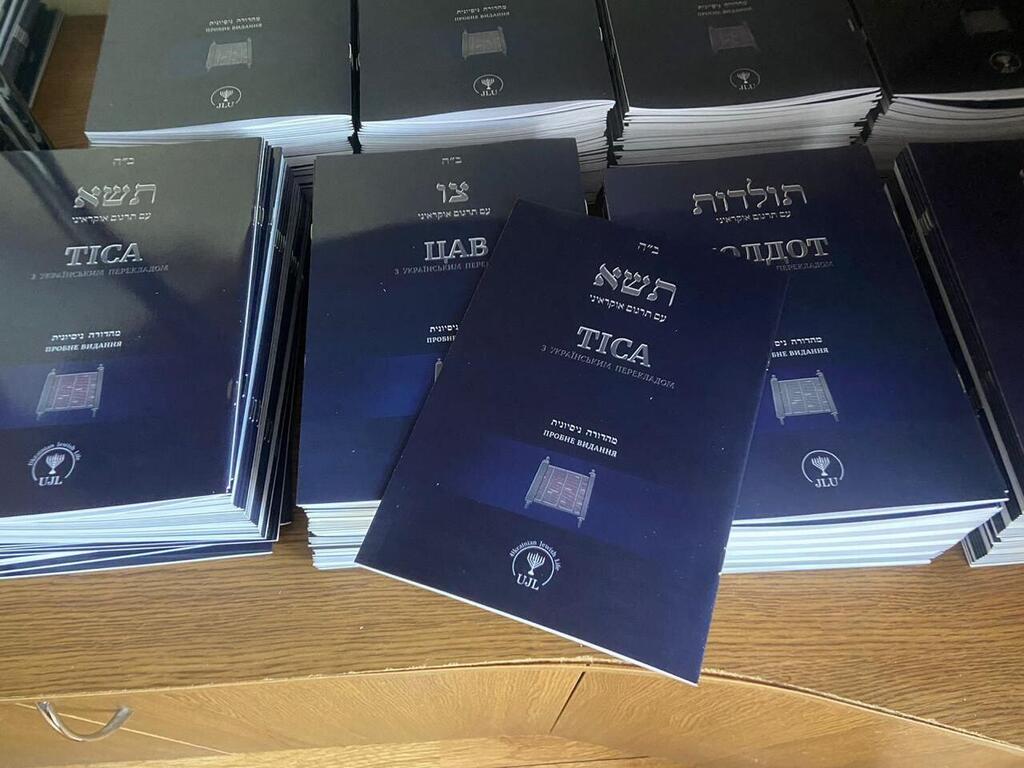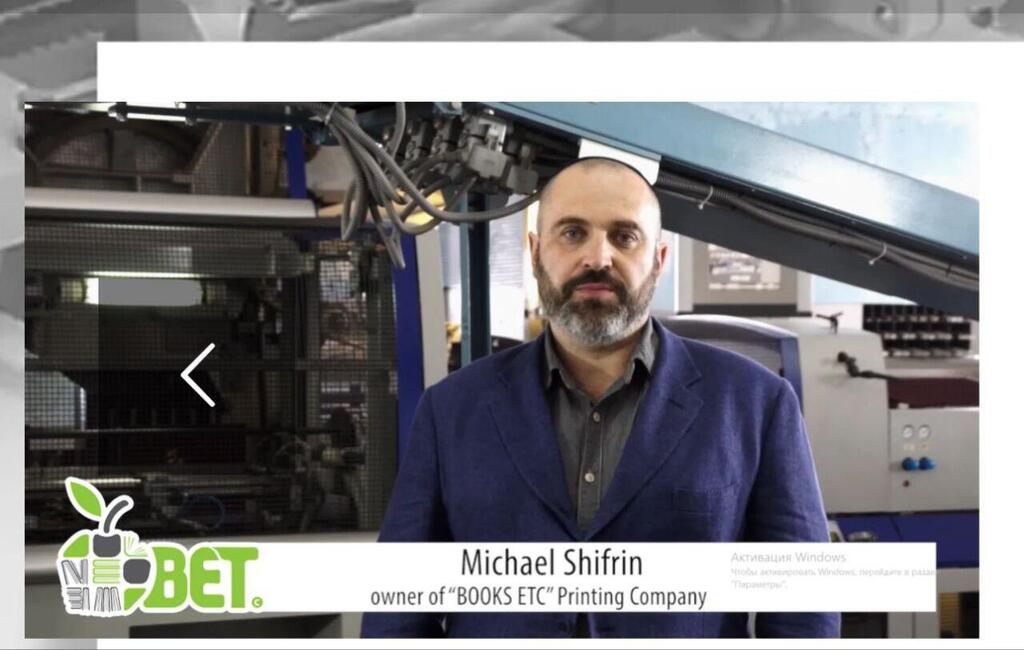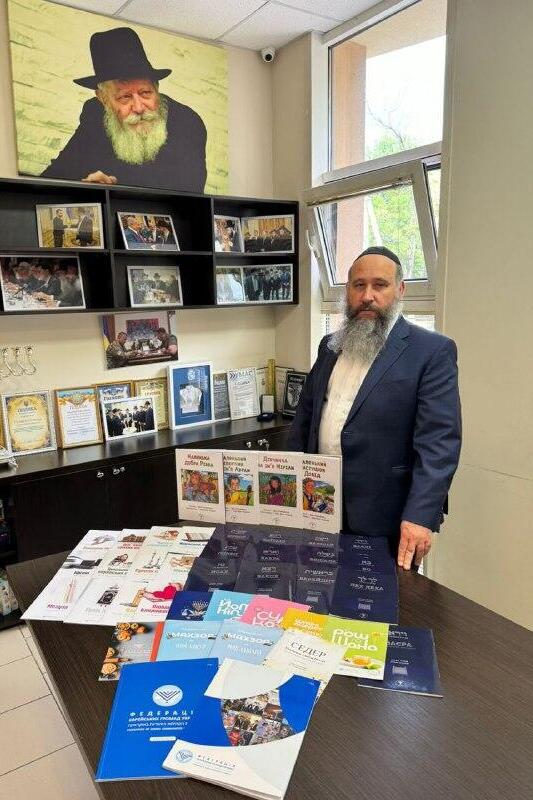Since the onset of the war between Russia and Ukraine, many Ukrainians have boycotted the Russian language, and numerous Jews in Ukraine refuse to open sacred texts in the language of their adversary. Meanwhile, reports from nearly every Jewish community in Ukraine reveal an influx of new worshippers at synagogues, driven by a desire for community belonging amid the severe security situation and uncertainty. This backdrop has highlighted the need to translate the Bible and other essential Jewish sacred texts into Ukrainian.
3 View gallery


Leading this new initiative are two individuals: Michael Shifrin, 52, a native of Kharkiv and the owner of a large printing house in the city, and Rabbi Meir Stambler, chairman of the Federation of Jewish Communities in Ukraine (FJCU). Shifrin had been unaware of his Jewish heritage, even when he immigrated to Israel in 1991. It was only a year later that he discovered his Jewish identity. After his father died he began attending the local synagogue in Kharkiv, and eventually embraced religious life thanks to Rabbi Moshe Moskowitz, the city's rabbi.
Simultaneously, Shifrin’s business started to flourish. In 2005, after several years of selling equipment to printing houses, he decided to open his own printing house. He leased a massive 12,000-square-meter space, purchased expensive machinery, and launched a very large printing house that quickly gained a stellar reputation. Before the war, 200 employees worked there, and he also collaborated with publishers of sacred books in Israel.
When the war broke out, Shifrin fled to a refugee camp established by the FJCU, in cooperation with the EMIH Association of United Hungarian Jewish Congregations community, on the shores of Lake Balaton in Hungary. This camp continues to house refugees. Shifrin and Stambler, who had known each other previously, met there, and the rabbi proposed the idea of translating and printing the Jewish Bible in Ukrainian.
"At that meeting two years ago, Rabbi Stambler approached me and asked if he could print Jewish literature in Ukrainian at my printing house at a discount," Shifrin recalls. "I agreed, but 15 minutes later I returned to him and informed him that I also wanted to be an active partner in this significant endeavor, and that a good friend of mine – a wealthy man named Mark Winersky from Kharkiv – was also willing to partner. We agreed that the Federation would cover a third of the costs, and the rest would be financed by Winersky and me. Winersky had thought about this issue years ago and had attempted to publish a prayer book or Five Books of Moses in Ukrainian a decade ago, but there was no demand then. Almost no one spoke Ukrainian; it was on the fringes, so it was shelved. When I called him that day with the proposal, he was overjoyed, and that's how we got started."
3 View gallery


Michael Shifrin
To date, Shifrin and Winersky, along with donors brought in by the Federation, have invested over $1 million in the project, which is non-profit driven and is not intended to be. However, the project has also been impacted by the war. At the outset, two Russian missiles hit Shifrin's printing house, causing damage estimated at over $3 million and damaging expensive machinery, but the translation project continued as planned.
Shifrin serves as the project manager and has established a network of translators, linguists and rabbis, each of whom works meticulously.
"It's very challenging to find rabbis who are fluent in Ukrainian, but we managed to assemble a top-notch professional team," according to Stambler. "Sometimes the team can spend an entire day deliberating over the correct translation of a single word, but thank God they eventually overcome all challenges. As part of their work, and to ease the process, they rely on existing Torah translations in English and Russian. We've already translated the entire Torah, including the Haftarahs. The final translation, after all the linguistic edits by the printing house's language professionals – who, by the way, are not Jewish – has so far been completed for Genesis, Exodus and half of Leviticus, with the rest still in progress."
Meanwhile, they print the translation of the weekly Torah portion that will be read in synagogues each Sabbath, and the Federation ensures its distribution in thousands of copies across Ukraine, with the help of Chabad emissaries.
"For Shavuot, for example, we distributed a booklet about the Ten Commandments. At the end of these booklets, we ask the public for feedback on the material and, indeed, we receive responses every week. Most are, of course, enthusiastic thank-yous, but every week we also get constructive feedback regarding the translation, which we take into consideration and apply to the translation of the remaining two and a half books that have not yet been fully professionally translated."
Shifrin added: "We also translated the Book of Esther and the Passover Haggadah, which were sent to tens of thousands of Jewish homes across the country, along with holiday aid packages, Jewish books for children and the Book of Psalms. Currently, we are working on translating the prayer book and preparing a second, revised edition of the Book of Psalms."
3 View gallery


Rabbi Meir Stambler, chairman of the Federation of Jewish Communities in Ukraine
About a year and a half ago, President Volodymyr Zelensky gave a speech to diplomats from around the world, addressing Ukraine's security situation. Suuddenly, in the middle of his speech, he unusually quoted from the Book of Psalms. In his speech, the president recited several verses from Psalm 3: "But you, Lord, are a shield around me, my glory, the One who lifts my head high. I call out to the Lord, and he answers me... I will not fear though tens of thousands assail me on every side." The president continued, "We have been standing against evil for almost a year. We are united as we have not been in years. We are brave – our warriors have struck at evil on the battlefield. Did this happen solely because of human efforts– or did God hear our prayers?"
According to Stambler: "What was not known is the fascinating story that took place behind the scenes. A few days earlier, Zelensky celebrated his 45th birthday, and in honor of the occasion Rabbi Rafael Roitman, on behalf of the Federation, gave him a gift – the first volume of Psalms that we had translated into Ukrainian, bound in leather with the president's name embossed on it: Volodymyr Oleksandrovych Zelensky. The president began reading these Psalms, and that's where he got the idea to quote King David during that important meeting."
Rabbi Moshe Moskowitz, the rabbi of Kharkiv, added: "It is written that Moses spent the last month of his life translating the Torah into 70 languages, which itself indicates the great importance of this endeavor. Translating the Torah into a new language, in which the Torah has never been printed before, is very significant as it makes it accessible to hundreds of thousands of Jews. This is a privilege and a duty that cannot be overstated. Moreover, it is crucial to have a Jewish-religious translation of the Torah, because otherwise, Jews might rely on a Christian-church translation, which could be deliberately erroneous and misleading to entrap innocent Jews. The first to translate owns the narrative."
No comments:
Post a Comment